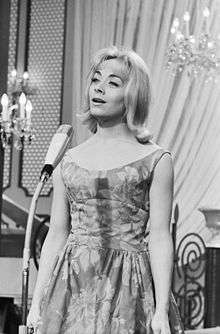Isabelle Aubret
| Isabelle Aubret | |
|---|---|
|
Isabelle Aubret | |
| Background information | |
| Born |
27 July 1938 Lille, France |
| Origin | Lille, France |
| Occupation(s) | Singer |
| Years active | 1952––present |
Isabelle Aubret (born 27 July 1938)[1] is a French singer.
Born as Thérèse Coquerelle in Lille, France, she won the Eurovision Song Contest in 1962 representing France and singing "Un premier amour" (A first love) with music composed by Claude-Henri Vic and lyrics by Roland Stephane Valade.[1][2] In 1968, she returned to the contest, again representing France, finishing third, and singing "La source" (The Spring) with music by Daniel Faure and lyrics by Henri Dijan, and Guy Bonnet.[1][2]
Aubret was a participant in the French national heats for Eurovision in other years. Her first attempt was in 1961 with the song "Le gars de n'importe où". She was awarded second place.[2] Another runner-up spot came Aubret's way in 1970 when she teamed up with Daniel Bératta for the song "Olivier, Olivia". She was not as successful with her 1976 effort, "Je te connais déjà" which finished sixth out of seven songs in the second semi-final. Her final challenge for Eurovision was in 1983 with the patriotic "France, France" which took her to third place.[1][2]
Partial discography

- 1969: Isabelle Aubret
- 1981: Liberté
- 1984: Le monde chante
- 1987: Vague à l'homme
- 1989: 1989
- 1990: Vivre en flèche
- 1990: Allez allez la vie (live concert album)
- 1991: In love
- 1992: Coups de cœur
- 1992: Isabelle Aubret chante Aragon
- 1993: Isabelle Aubret chante Ferrat
- 1993: C'est le bonheur
- 1995: Elle vous aime (compilation album)
- 1995: Isabelle Aubret chante Brel
- 1997: Isabelle Aubret chante pour les petits et les grands
- 1997: Changer le monde
- 1999: Parisabelle
- 2001: Le paradis des musiciens
- 2001: Bobino 2001 (live concert album)
- 2002: Cosette et Jean Valjean
- 2005: Les Indispensables
- 2006: 2006
- 2009: Ses plus belles chansons (compilation album)
References
External links
| Wikimedia Commons has media related to Isabelle Aubret. |
- Official site (in French)
- Biography, from Radio France International (in English)
| Awards and achievements | ||
|---|---|---|
| Preceded by with "Nous les amoureux" |
Winner of the Eurovision Song Contest 1962 |
Succeeded by with "Dansevise" |
| Preceded by Jean-Paul Mauric with "Printemps, avril carillonne" |
France in the Eurovision Song Contest 1962 |
Succeeded by Alain Barrière with "Elle était si jolie" |
| Preceded by Noëlle Cordier with "Il doit faire beau là-bas" |
France in the Eurovision Song Contest 1968 |
Succeeded by Frida Boccara with "Un jour, un enfant" |